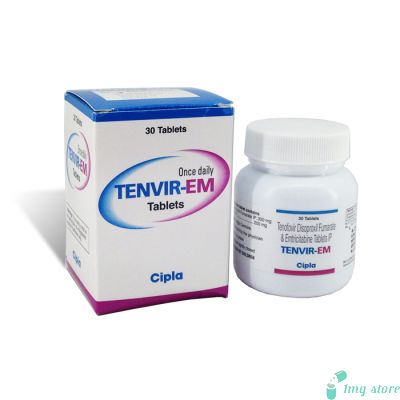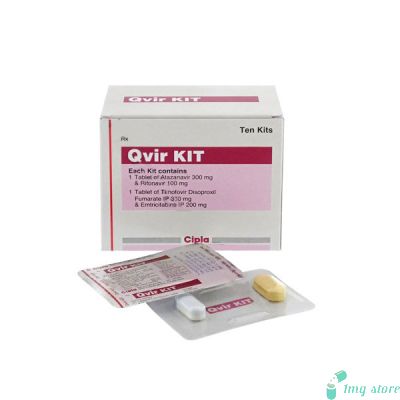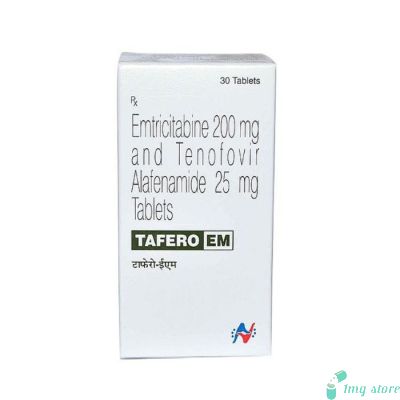Lopimune Tablet (Lopinavir + Ritonavir)
Buy Lopinavir + Ritonavir Tablet commonly marketed as Lopimune and Kaletra, is a combination antiretroviral medication used in the treatment of human immunodeficiency virus (HIV) infection. Lopimune contains two active ingredients: Ritonavir and Lopinavir.
Ritonavir + Lopinavir Tablet (Lopimune) is a Antiretroviral Medication
Ritonavir + Lopinavir Tablet, commonly marketed as Lopimune, is a combination antiretroviral medication used in the treatment of human immunodeficiency virus (HIV) infection. Lopimune contains two active ingredients: Ritonavir and Lopinavir. Both of these drugs belong to a class of antiviral medications known as protease inhibitors. When used in combination, they work synergistically to inhibit the replication of the HIV virus, reducing its viral load in the body and helping to slow down the progression of the disease. Lopimune is commonly prescribed as part of highly active antiretroviral therapy (HAART) regimens for patients diagnosed with HIV. Kaletra is another commonly known brand name for the combination of Ritonavir and Lopinavir. Like Lopimune, Kaletra is used to treat HIV infection and works in a similar manner by inhibiting viral replication. It is available in various formulations, including tablets and oral solutions, to cater to different patient needs. Patients should be aware that Lopimune and Kaletra are essentially the same medication, with the same active ingredients, but may be marketed under different brand names by different pharmaceutical companies.
Dosage Information
The dosage of Ritonavir + Lopinavir Tablet (Lopimune) may vary based on individual factors such as the patient's age, weight, overall health condition, and other medications they may be taking. It is essential to follow the prescribing doctor's instructions carefully and not modify the dosage without consulting a healthcare professional. Typically, the standard dosage for adults is one tablet (200 mg of Lopinavir and 50 mg of Ritonavir) taken orally, twice a day. For pediatric patients, the dosage may be adjusted according to their weight and specific medical needs. The tablets should be taken with food to enhance absorption and minimize potential gastrointestinal side effects.
Ritonavir + Lopinavir Tablet Alternatives
In some cases, individuals may require alternative medications due to factors such as drug interactions, intolerance to certain components, or resistance to the drugs. Some of the alternative treatment options for HIV infection include:
- Efavirenz + Emtricitabine + Tenofovir: This is another widely used combination of antiretroviral drugs that work effectively in suppressing HIV replication.
- Dolutegravir + Lamivudine + Tenofovir: This combination is well-tolerated and highly effective in controlling viral load in HIV-infected individuals.
- Darunavir + Cobicistat + Emtricitabine + Tenofovir Alafenamide: This is a combination of drugs used in certain treatment-naive patients or those with specific resistance profiles.
Buy Lopinavir + Ritonavir Tablet: Purchase Ritonavir + Lopinavir Tablet (Lopimune or Kaletra) conveniently at 1mgstore.com. Ensure you have a valid prescription before making the purchase. We offer Ritonavir + Lopinavir Tablet for sale at competitive prices on our website. Buy with confidence from a trusted source.
Some of the precautionary measures to be taken while using Lopimune Tablet (Lopinavir + Ritonavir)
- Strict Adherence to Dosage and Schedule: Ritonavir + Lopinavir Tablet is a Life-Saving Drug used in the treatment of HIV infection. It is crucial for patients to follow the prescribed dosage and schedule diligently. Skipping doses or not taking the medication as directed may lead to viral resistance and treatment failure.
- Regular Medical Check-ups: Buy Lopinavir + Ritonavir/Kaletra but remember Patients should have regular follow-up visits with their healthcare provider. These check-ups are essential to monitor the patient's response to the treatment, assess any side effects, and make necessary adjustments to the therapy if needed.
- Pregnancy and Breastfeeding: Pregnant women and those planning to become pregnant should inform their healthcare provider before starting Ritonavir + Lopinavir treatment. The medication's safety during pregnancy is still being studied, and alternatives may be considered based on individual circumstances. Additionally, it is essential to discuss breastfeeding options, as the drug may pass into breast milk.
- Allergies and Hypersensitivity: Individuals with a known allergy to Ritonavir, Lopinavir, or any other component of the medication should avoid its use. Allergic reactions can range from mild skin rashes to severe anaphylaxis, necessitating immediate medical attention.
- Liver and Kidney Function: Patients with impaired liver or kidney function may require dose adjustments or close monitoring while on Ritonavir + Lopinavir therapy. The medication is metabolized and eliminated through these organs, so any impairment may affect its levels in the bloodstream.
- Cardiovascular Health: Ritonavir + Lopinavir may lead to changes in lipid levels and contribute to cardiovascular risks. Patients with a history of heart disease or risk factors should be closely monitored during treatment.
- Diabetes: The use of Ritonavir + Lopinavir may lead to elevated blood sugar levels, particularly in individuals with pre-existing diabetes. Regular blood sugar monitoring is crucial for diabetic patients on this medication.
Some of the specific indications for Ritonavir + Lopinavir Tablet (Lopimune) include
- HIV Infection: The primary use of Ritonavir + Lopinavir Tablet is in the treatment of HIV infection. When used in combination with other antiretroviral drugs, it helps to suppress viral replication and improve the patient's immune function. This, in turn, reduces the risk of opportunistic infections and AIDS-related complications, ultimately prolonging the patient's life.
- Prevention of Mother-to-Child Transmission (PMTCT): Lopimune is also used in pregnant women living with HIV to reduce the risk of transmitting the virus to their unborn children. Administering the medication during pregnancy and childbirth significantly reduces the chances of vertical transmission.
- Post-Exposure Prophylaxis (PEP): In cases of potential exposure to HIV, such as through occupational accidents or unprotected sexual intercourse, Ritonavir + Lopinavir Tablet may be prescribed as part of post-exposure prophylaxis to prevent the establishment of an infection.
- Pre-Exposure Prophylaxis (PrEP): In some cases, Lopimune/Kaletra may be used as pre-exposure prophylaxis in individuals at high risk of contracting HIV. By taking the medication consistently, these individuals can reduce their chances of becoming infected.
- Off-Label Uses: In some instances, Ritonavir + Lopinavir Tablet may be used off-label for the treatment of other viral infections, but this should only be done under the supervision of a healthcare professional.
Ritonavir + Lopinavir Tablet Deals: Check out our exclusive deals on Ritonavir + Lopinavir Tablet, making antiretroviral therapy more accessible and affordable. Ritonavir + Lopinavir Tablet Specifications and Price: Find detailed specifications and the current price of Ritonavir + Lopinavir Tablet on our website. We provide all the essential information to help you make an informed purchase decision.
Important Adverse effects of using Lopimune Tablet (Lopinavir + Ritonavir) must be noticed
- Gastrointestinal Disturbances: Common side effects of Ritonavir + Lopinavir Tablet include nausea, vomiting, diarrhea, and abdominal discomfort. These symptoms can usually be managed by taking the medication with food.
- Metabolic Changes: The drug may cause lipid abnormalities, such as increased levels of cholesterol and triglycerides. Additionally, it may lead to insulin resistance and diabetes in some individuals.
- Liver and Pancreatic Toxicity: In rare cases, Ritonavir + Lopinavir/Kaletra can cause liver toxicity, manifesting as elevated liver enzyme levels. Severe cases may result in hepatitis or liver failure. Similarly, pancreatitis (inflammation of the pancreas) is a potential adverse effect.
- Skin Reactions: Allergic skin reactions, including rashes and Stevens-Johnson syndrome (a severe and potentially life-threatening skin disorder), have been reported in some patients using the medication.
- Cardiovascular Events: Ritonavir + Lopinavir may be associated with an increased risk of cardiovascular events, including heart attack and sudden cardiac death, particularly in patients with pre-existing cardiovascular risk factors.
- Immune Reconstitution Inflammatory Syndrome (IRIS): In some HIV-infected individuals, starting antiretroviral therapy, including Ritonavir + Lopinavir, can lead to an inflammatory response known as IRIS. This occurs as the immune system begins to recover and can result in the worsening of pre-existing infections.
- Fat Redistribution: Long-term use of Ritonavir + Lopinavir may lead to fat redistribution in the body, resulting in increased fat deposits in certain areas (lipohypertrophy) and loss of fat in other areas (lipoatrophy).
FAQ 1: Can Ritonavir + Lopinavir Tablet be taken with food?
Answer: Yes, it is recommended to take Ritonavir + Lopinavir Tablet with food to improve absorption and reduce gastrointestinal side effects.
FAQ 2: Can I miss a dose of Ritonavir + Lopinavir?
Answer: It is essential to adhere to the prescribed dosing schedule. If a dose is missed, take it as soon as remembered, unless it's almost time for the next dose. Do not double the dose.
FAQ 3: Does Ritonavir + Lopinavir Tablet/Kaletra interact with birth control pills?
Answer: Ritonavir may reduce the effectiveness of certain hormonal contraceptives like birth control pills. It is advisable to use additional or alternative contraceptive methods while on this medication.
FAQ 4: Can Ritonavir + Lopinavir Tablet be taken during pregnancy?
Answer: Ritonavir + Lopinavir should only be used during pregnancy if the benefits outweigh the potential risks. Pregnant women should discuss their options with a healthcare provider.
FAQ 5: Can I consume alcohol while on Ritonavir + Lopinavir treatment?
Answer: Alcohol consumption should be limited or avoided during Ritonavir + Lopinavir therapy as it may increase the risk of liver toxicity and interfere with the medication's effectiveness.
Important Drug Interconnections with Lopimune Tablet (Lopinavir + Ritonavir) must be noticed
- Other Antiretroviral Medications: Ritonavir + Lopinavir Tablet is often used in combination with other antiretroviral drugs. However, certain combinations may lead to drug interactions, necessitating dose adjustments or alternative medications. Always consult a healthcare professional before combining different antiretroviral drugs.
- Protease Inhibitors: The co-administration of Ritonavir + Lopinavir/Kaletra with other protease inhibitors may result in increased drug levels in the blood, potentially leading to toxicities. It is crucial to discuss potential drug interactions with the treating physician.
- CYP3A4 Inducers and Inhibitors: Ritonavir is a potent inhibitor of the CYP3A4 enzyme, which plays a significant role in drug metabolism. Concurrent use of medications that induce or inhibit CYP3A4 can impact the levels of Ritonavir + Lopinavir or other co-administered drugs.
- Statins: Combining Ritonavir + Lopinavir with certain statins used to control cholesterol levels may increase the risk of muscle-related adverse effects. The healthcare provider may consider alternatives or adjust statin doses to minimize these risks.
- Sedatives and Anti-Anxiety Medications: Ritonavir + Lopinavir can interact with medications used for sedation or anxiety, leading to increased or prolonged effects of these drugs. Dose adjustments may be necessary.
| Manufacturer | : | Cipla Pharma, India |
| Equivalent Brand | : | Kaletra |
| Generic Search | : | Lopinavir + Ritonavir |




















